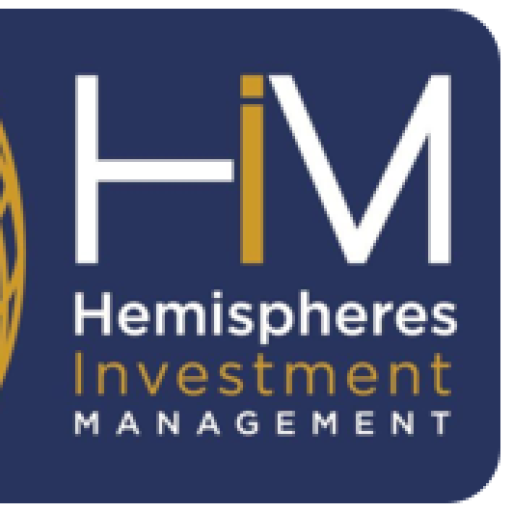 Hemispheres Investment Management
Hemispheres Investment Management

Hemispheres Investment Management Global Equities
The firm’s flagship investment product is its Global Equities strategy. The Global Equities portfolio consists of high-quality companies diversified by sector, country, and region with size limitations. The portfolio incudes value-oriented, high conviction equities and typically holds around 45 to 50 securities. Hemispheres commenced managing the strategy in February 2015.
Historical Performance (net returns as of December 31, 2023)
| Time Period | HIM Global Equities | MSCI Global Value Benchmark |
|---|---|---|
| 3-Year | 7.36% | 6.07% |
| 5-Year | 14.02% | 8.11% |
| 7-Year | 12.13% | 7.08% |
| From 1/31/2015 | 10.64% | 7.93% |
Disclosures:
- Past performance is not indicative of future performance.
- Equity portfolios do not receive FDIC insurance. The Global Equities strategy could lose significant value.
- The calculation of global equities returns included cash.
- The Global Equities benchmark is the MSCI Global Value Index.
- Investing in the Hemispheres’ equity strategies entails substantial risks, including risks associated with investing in emerging markets.
- Envestnet Tamarac’s Portfolio Center software calculates time-weighted returns.
- The strategy reinvests dividends.
 Hemispheres Investment Management
Hemispheres Investment Management
Introduction to Equities
Definition of Equities:
Based upon a company’s financial statement, equity is defined as the value of the company’s assets less all indebtedness. The market value of a company’s equity ownership is based on daily trading in the stock market multiplied by the number of shares outstanding.
Ownership Implications: Equities represent an ownership share in a specific company. Each share of common stock is of equal value. By owning stock, shareholders participate in both the operating gains and the losses of the company.
Benefits of Equity Ownership
In addition to potentially earning a dividend on each common share investors benefit from price appreciation. Increased profitability often results in a higher share price which represents a gain on investment. .

Global Equities Explained
Definition of Global Equities: A global equities portfolio is composed of securities from both the United States and international stock markets. A Global Equities portfolio differs from an international equities portfolio that holds stocks from companies outside of the United States.
Diversification through Global Equities: Countries that participate in international stock markets around the world have different political and monetary policies as well as different regulations that affect shareholder returns. For example, the countries of Greece and Argentina held Presidential elections last year where pro-market candidates won the respective elections. The political environment influences both a country’s economic and equity market outlook. According to Bloomberg, the favorable political outcome resulted in the MSCI Greece and MSCI Argentina indices returning roughly 48% and 67%, respectively, in U.S. dollars for fiscal year 2023. These returns compare favorably to the S&P 500 and other US only benchmark returns.
Furthermore, Greece’s sovereign debt rating improved, benefiting equity and fixed income investors. In China following a slow COVID economic recovery, the government adopted quantitative easing (QE) monetary policy. The QE policy compared to quantitative tightening in the US and other Western economies. While this metric alone ignores geopolitical risk, in general, quantitative easing is bullish for a country’s stock market. There are over 45 countries with investible stock markets. Not all countries have the same monetary and fiscal policies and those policies matter to foreign investors. Globally, investors can choose from over 10,000 market-leading companies with market capitalizations over $1 billion. This compares to over 2,000 in the US alone. This broader selection offers higher diversification potential and enhanced returns.
Role of Equities in Investment
- Long-Term Investment Potential
- For the period December 31, 1987 to December 31, 2023, the indices shown below recorded the following annualized compounded returns. The returns include the reinvestment of dividends:
| S&P 500 | MSCI All Country World Index | MSCI Emerging Market* | |
|---|---|---|---|
| *12/31/1987 – 12/31/2023 | *10.91% | 7.65% | 8.81% |
Over the last 36 years, the S&P 500 outperformed both the MSCI ACWI and EM indices.
- Correlation:
- Although the S&P 500 earned the highest returns, the low correlation value of emerging market highlights the opportunities to take advantage of the volatility in equity markets to purchase attractively valued securities in globally diversified investment portfolios (please refer to the correlation matrix below for statistics from 1988 to 2023).
| S&P 500 | MSCI ACWI | MSCI EM | Investment Grade Bonds | |
|---|---|---|---|---|
| S&P 500 | 1.0 | 0.91 | 0.62 | 0.05 |
| MSCI ACWI | 0.91 | 1.0 | 0.77 | 0.06 |
| MSCI EM | 0.62 | 0.77 | 1.0 | 0.03 |
| Investment Grade Bonds | 0.05 | 0.06 | 0.03 | 1.0 |
Statistically, a correlation value less than 0.7 indicates that the movements between the S&P 500 and the MSCI Emerging Markets are not highly correlated. This difference provides investors with opportunities to buy or sell international stocks when their prices move differently from those in the US.

- Risk/Reward:
- As a global equities value investor, Hemispheres focuses its research efforts searching for undervalued companies. The more undervalued the company, the higher the potential upside for investors when it reaches its fair-market-value price. With over 47 markets to choose from and over 10,000 companies with a market capitalization in excess of $1 billion, a plethora of securities provides global investors with substantial opportunities in domestic and international stock markets. Hemispheres reduces investor risk by buying undervalued stocks from the standpoint that fully valued or overvalued stocks are riskier considering that their return is vulnerable to the movement of stock market indices or a decline to their fair-market-value.
- Diversification:
- As investment managers, one of our investment goals is to protect against the deleterious effects of inflation. Owning stocks provides just that and more. Using historical data from the previous section, the S&P 500 Index realized an annual compounded return of 10.91% over the last 35 years. The inflation rate averaged just over 2.75% over that same period. Thus, stocks amply outperformed inflation. For investors with ownership of both stocks and bonds, both investment asset classes realized returns superior to inflation. Investment grade bonds, represented by the Bloomberg Aggregate Bond Index, returned 5.44% from 1988 to 2023. Fixed income securities bested inflation by over 2.5%/yr., although less than stocks. Stocks generally realize higher returns than bonds, however equities are more volatile than fixed income securities. For long-term investors, the reward for owning stocks is that they materially outperform, on a total return comparison, inflation, and bonds.

Issuance of Global Equities by Companies
Raising Capital Internationally: There are multiple ways that firms raise capital both domestically and internationally and the methods are similar worldwide. Companies can raise capital privately or publicly. The firm must meet stricter regulatory and reporting requirements when it raises capital publicly in the jurisdiction where it markets the securities. Most commonly, just like in the United States, firms employ investment bankers to underwrite, issue and market the capital offering to market participants.
Types of Public Equity Offerings: When a private entity determines that it would be cost effective and provide greater access to capital, it may decide to issue a public equity offering. The first public offering of common stock is the Initial Public Offering (IPO). Investment bankers hired to take the firm public evaluate the stock prices of comparable entities to determine the initial offering price. Secondary offerings vary. A company can sell shares that were previously issued and held. Alternatively, the company may authorize additional shares or raise more capital through a rights offering.
Regulations and Exchanges: In the United States, companies are regulated by state and federal regulators. Depending upon the sector that the firm operates in, there are regulatory bodies familiar with a firm’s operations, safety record and procedures, etc. As an example, energy companies are regulated by the Department of Energy. The Federal Regulator concerned with financial reporting, stock issuances and trading is the Securities and Exchange Commission. The Stock Exchanges monitor the companies that list their stock there. The largest exchanges in the United States are the New York Stock Exchange and the Nasdaq.
Raising Capital Internationally: There are multiple ways that firms raise capital both domestically and internationally and the methods are similar worldwide. Companies can raise capital privately or publicly. Stricter regulatory and reporting requirements exist for a firm when capital is raised publicly in the jurisdiction where securities are marketed. Most commonly, just like in the United States, firms employ investment bankers to underwrite, issue and market the capital offering to market participants.
Regulation and Exchanges Internationally
- There are over 47 stock markets that are included in the MSCI All Country World Index (23 Developed Markets and 24 Emerging Market countries). All these markets have regulatory oversight of their listed companies. Hemispheres owns market leading or high-quality companies, of which many adhere to international accounting standards; some companies even dually report their financial results using their domestic market accounting standards and U.S accounting standards (U.S. Generally Accepting Accounting Standards [GAAP]. Additionally, the world’s regulators often work together to coordinate reporting standards.
- Per data from MSCI which tracks 85% of the world’s listed companies, the aggregated value of MSCI All Country World Index is almost $68 trillion, as of the end of January 2024. The largest country weightings of the ACWI Index are:
| Country Weighting | Value in U.S. $ Trillion | |
|---|---|---|
| United States | 63.2% | $42.7 |
| Japan | 5.6% | $3.8 |
| United Kingdom | 3.5% | $2.4 |
| France | 2.9% | $1.9 |
| Canada | 2.8% | $1.9 |
| Other Countries | 22.0% | $14.9 |
The U.S. stock markets weighting are huge compared to the rest of the world. The top 10 constituents of the ACWI Index are all U.S. listed companies. With so much of global stock market capitalization concentrated in the U.S., Hemispheres tends to have at least 40% of its global equity portfolios in U.S. incorporated companies. The major global stock exchanges include London, Amsterdam/Euronet, Frankfurt, Warsaw, Tokyo, and Hong Kong.

Contact Us Now
We recognize that individual and institutional investors alike may be new to investing in Global Equities. There are complexities and nuances associated with investing in various markets that require expert guidance. Hemispheres Investment Management’s team of seasoned professionals have a 35-year track record of successfully managing investment strategies.
Please contact Hemispheres Investment Management for a free consultation. We offer personalized guidance and strategies that can help you or your business leverage global equities to meet your financial objectives. Book a Meeting
iHemispheres uses 12/31/87 as the start date for this analysis as Bloomberg, the firm’s data source, has data on the Morgan Stanley Capital Index (MSCI) Emerging Markets and All Country World Indexthat starts on 12/31/1987.

Michael Hart, CFA
CEO and Director of International Research
Michael Hart has over 30 years of capital market experience. From 2007 to 2013, he worked as a Managing Director at Tradewinds Global Investors, where he was a global equity and emerging market equity portfolio manager and a global securities analyst. Prior to Tradewinds, Michael founded and operated Hemisphere Asset Management from 2000 to 2007; the Firm managed global equity, fixed income, and balanced accounts for individuals and institutions. From 1989 to 2000, he helped manage the investment portfolios of the Farmers Insurance Group of Companies as a Senior Portfolio Manager.

Rebecca Holden, CFA
Director of Domestic Research
Rebecca Holden has over 30 years of capital market experience. From 2003 to 2010, Rebecca was Portfolio Manager and Principal at Archer Capital Management in Los Angeles, California, managing domestic equity portfolios for individual clients. Prior to working at Archer, Rebecca was an equity analyst employed by Lehman Brothers in New York City following electric and gas utilities as well as energy companies. Before relocating to NYC, Rebecca was employed as an Intermediate Portfolio Manager for the Farmers Insurance Group of Companies as one of four corporate portfolio managers.
Rebecca was employed with prominent west coast financial institutions prior to employment on the Farmers accounts. Rebecca held positions as a credit analyst, banker structuring both private and publicly held bond issuances and later manager of one of the largest groups at the bank. In addition to the professional designations held, Rebecca has an MBA from Brigham Young University with a double emphasis in Quantitative Analysis and Finance (Investments).
 Why choose us
Why choose us
Simplify Insurance Coverage Today
Another notable company is State Farm, a mutual insurance company that provides auto, home, and life insurance, as well as banking and financial services.
Project Completed Last Years
Happy Customer Worldwide

 Our Member
Our Member







